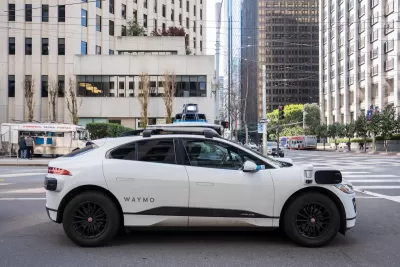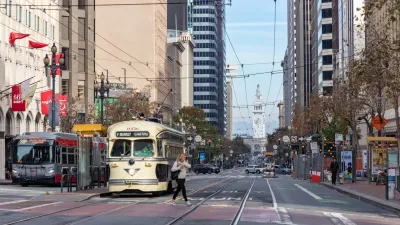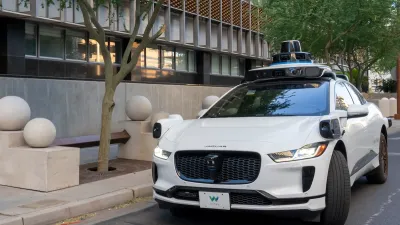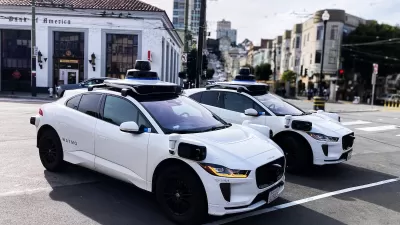Recent efforts to paint autonomous ride-hailing services as a complement to public transit are, according to CityLab’s David Zipper, greenwashing.

Is autonomous ride-hailing “an asset to cities and transit agencies?” In a piece for Bloomberg CityLab, David Zipper questions this assertion, which robotaxi companies are eager to make. “Transit-robotaxi synergy is an enticing message at a time when public transportation agencies face a dire funding shortage, and it could especially resonate among left-leaning residents in places like the Bay Area who value buses and trains even if they seldom use them.”
But the industry is “a wolf in sheep’s clothing,” Zipper warns. After outlining the potential problems with a Waymo promotion that encourages people to get dropped off at Bay Area transit stations, Zipper notes that “According to a 2022 study of the region, just 0.4% of the region’s transit journeys included a ride-hail trip.”
Automobiles inflict damage that many cities are now trying to reverse by encouraging transit or biking, which are far more space-efficient and sustainable than even an electric car, autonomous or not.
Zipper adds that autonomous ride-hailing will likely follow the same pattern as its human-driven predecessors, which did not yield an increase in transit trips and often created more congestion. “In fact, a surge in self-driving cars would likely be a net negative for transit (even if the vehicles do not squat on transit lines and bus stations, as has happened repeatedly in San Francisco).”
FULL STORY: Robotaxis Are No Friend of Public Transportation

Alabama: Trump Terminates Settlements for Black Communities Harmed By Raw Sewage
Trump deemed the landmark civil rights agreement “illegal DEI and environmental justice policy.”

Study: Maui’s Plan to Convert Vacation Rentals to Long-Term Housing Could Cause Nearly $1 Billion Economic Loss
The plan would reduce visitor accommodation by 25% resulting in 1,900 jobs lost.

Planetizen Federal Action Tracker
A weekly monitor of how Trump’s orders and actions are impacting planners and planning in America.

Waymo Gets Permission to Map SF’s Market Street
If allowed to operate on the traffic-restricted street, Waymo’s autonomous taxis would have a leg up over ride-hailing competitors — and counter the city’s efforts to grow bike and pedestrian on the thoroughfare.

Parklet Symposium Highlights the Success of Shared Spaces
Parklets got a boost during the Covid-19 pandemic, when the concept was translated to outdoor dining programs that offered restaurants a lifeline during the shutdown.

Federal Homelessness Agency Places Entire Staff on Leave
The U.S. Interagency Council on Homelessness is the only federal agency dedicated to preventing and ending homelessness.
Urban Design for Planners 1: Software Tools
This six-course series explores essential urban design concepts using open source software and equips planners with the tools they need to participate fully in the urban design process.
Planning for Universal Design
Learn the tools for implementing Universal Design in planning regulations.
Caltrans
Smith Gee Studio
Institute for Housing and Urban Development Studies (IHS)
City of Grandview
Harvard GSD Executive Education
Toledo-Lucas County Plan Commissions
Salt Lake City
NYU Wagner Graduate School of Public Service





























